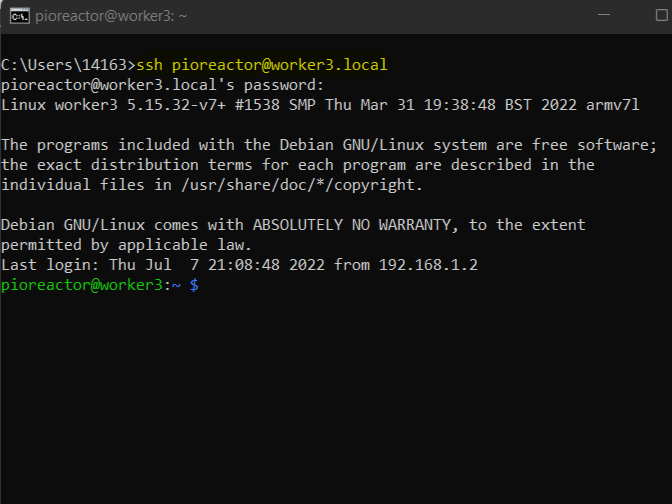Accessing the Pioreactor via SSH
For more customization and control of your Pioreactor, you can access the Pioreactor's (Raspberry Pi's) command line. From the command line, you can view more logs, control individual Pioreactors, and more.
If you are new to SSH: SSH is a secure way to open a text-only session to another computer. You'll type commands in a terminal window and see responses directly from the Pioreactor.
What you will see
- Terminal / command prompt: the app that shows a text window (no mouse needed).
- Prompt: the line waiting for input, often ending with
$. Example:pioreactor@worker3:~ $. - Command: the text you type at the prompt, then press Enter to run.
Access from Windows
There are two simple ways to access the Raspberry Pi from a Windows desktop.
1. Using the Command Prompt
-
Type
ssh pioreactor@<insert unit name or ip>.local. For example, to access on our Pioreactor named worker3, we typedssh pioreactor@worker3.localor via it's IPv4:ssh pioreactor@192.168.0.11. -
If asked "The authenticity of host...", enter "yes". This is a one-time trust check for that specific Pioreactor.
-
The default password is
raspberry(see note below).noteIf the
.localaddress doesn't resolve, use the Pioreactor's IPv4 address instead (for example,ssh pioreactor@192.168.0.11).infoWhen typing in the password, characters may not appear up as you type - that's expected. This is a security feature.

If successful, try entering pio blink - your Pioreactor's blue LED should starting blinking. See more commands here.
2. Using PuTTY
Start by installing the program PuTTY. Once downloaded, open PuTTY. Enter your Pioreactor's name as the hostname (if working with a cluster, enter your leader's hostname). Click "Open". If this is the first time to connect to the Raspberry Pi, you will have to accept its SSH certificate. On the next screen, use the username / password: pioreactor / raspberry.
If successful, try entering pio blink - your Pioreactor's blue LED should starting blinking. See more commands here.
Access from a Mac
- Open the Terminal application.
- From the command line, enter
ssh pioreactor@<name of pioreactor>.local. If this is the first time to connect to the Raspberry Pi, you will have to accept its SSH certificate. When prompted, enter the passwordraspberry.
When typing in the password, it may not show up as you type (this is a security feature)
If the .local address doesn't resolve, use the Pioreactor's IPv4 address instead (for example, ssh pioreactor@192.168.0.11).
If successful, try entering pio blink - your Pioreactor's blue LED should starting blinking. See more commands here.
Access from Linux
- Open your Terminal app.
- Enter
ssh pioreactor@<name of pioreactor>.localand accept the host key if prompted. - Enter the password
raspberry.
If the .local address doesn't resolve, use the Pioreactor's IPv4 address instead (for example, ssh pioreactor@192.168.0.11).
If successful, try entering pio blink - your Pioreactor's blue LED should starting blinking. See more commands here.
Troubleshooting
If the above steps aren't working for your system, try the following:
- Instead if using the
<unit name>.local, try using the IP address (if available). Example,ssh pioreactor@192.168.1.30for a Raspberry Pi at IP address 192.168.1.30. - Try power-cycling the Pioreactor.
- Make sure your computer is on the same network as the Pioreactor (the
.localname only works on the same network).